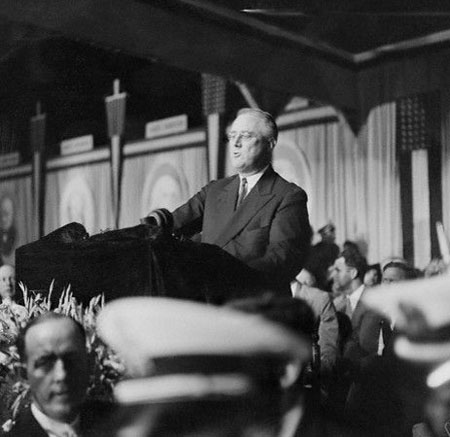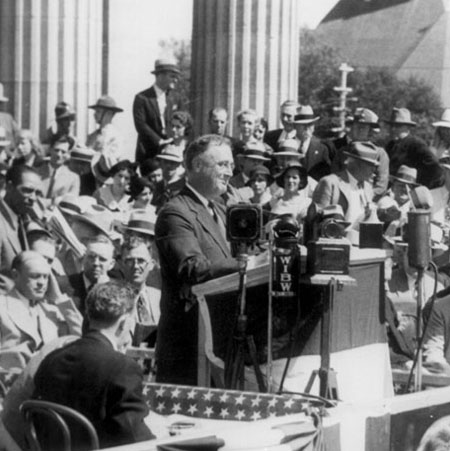Down to the wire on debt-ceiling blues .. US economic royalists are back, but hardly anyone is calling their bluff
Jul 28th, 2011 | By Randall White | Category: In BriefTo start with, it may seem ironic that the Vancouver Sun (no doubt like other Postmedia News outlets in Canada) has chosen one of “Britain’s leading business and economics commentators” (Jeremy Warner at the right-wing Daily Telegraph) to explain why “America cannot lead the world if it abandons principles.”
On closer inspection it is quite logical. The so-called American principles that Mr. Warner espouses are the same ones that Franklin Delano Roosevelt attacked so adroitly as “economic royalism” 75 years ago, in his “Speech before the 1936 Democratic National Convention, Philadelphia, Pennsylvania, June 27, 1936, A Rendezvous With Destiny.”
Mr. Warner from the UK, eg, presents a radically different picture of the “American principles” of the founding decade of the 1770s than Mr. Roosevelt from the USA. “On December 16, 1773,” one of “Britain’s leading business and economics commentators” writes, “a group of Massachusetts colonists boarded ships belonging to the East India Company and threw the entire cargo into the sea. There, in tax rebellion, began the American Revolution … This iconic event in US history, the one from which the modern Tea Party takes its name, helped establish a national aversion to taxation that has remained at the heart of the American psyche ever since. For a people defined by the idea of rugged individualism, self-reliance and the frontier spirit, the presumption of low taxes – and correspondingly small government – is an article of faith as sacred as motherhood and apple pie.”
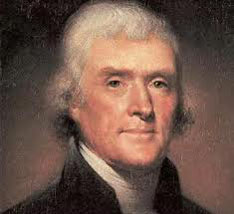
Thomas Jefferson, third President of the United States, and author of the 1776 American Declaration of Independence, whose only reference to taxation castigates “the present King of Great Britain ... For imposing Taxes on us without our Consent.”
The actual historic cry, however, was not “no taxation” or even “low taxation,” but “no taxation without representation.” (See the July 4, 1776 Declaration of Independence, eg, whose only reference to taxation castigates “the present King of Great Britain … For imposing Taxes on us without our Consent.”) And so back in the last time of great economic stress in the United States, the American president Franklin Delano Roosevelt talked about pledging “ourselves to restore to the people a wider freedom; to give to 1936 as the founders gave to 1776 – an American way of life … That very word freedom, in itself and of necessity, suggests freedom from some restraining power. In 1776 we sought freedom from the tyranny of a political autocracy – from the eighteenth-century royalists who held special privileges from the crown. It was to perpetuate their privilege that they governed without the consent of the governed.”
* * * *
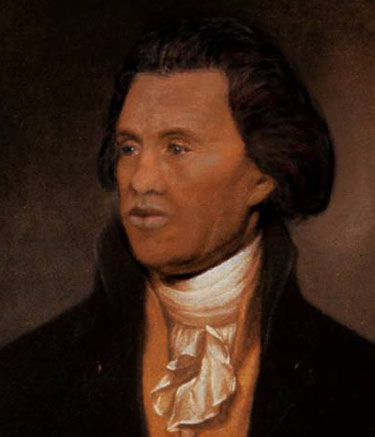
De'Shante Hemmings, said to be the son of Thomas Jefferson and his African American mistress Sally Hemmings.
President Roosevelt went on: “Since that struggle … new forces in our land … reordered the lives of our people …Â out of this modern civilization economic royalists carved new dynasties. New kingdoms were built upon concentration of control over material things. Through new uses of corporations, banks and securities, new machinery of industry and agriculture, of labor and capital – all undreamed of by the Fathers – the whole structure of modern life was impressed into this royal service … These economic royalists complain that we seek to overthrow the institutions of America. What they really complain of is that we seek to take away their power. Our allegiance to American institutions requires the overthrow of this kind of power. In vain they seek to hide behind the flag and the Constitution. In their blindness they forget what the flag and the Constitution stand for … The brave and clear platform adopted by this convention, to which I heartily subscribe, sets forth that government in a modern civilization has certain inescapable obligations to its citizens, among which are protection of the family and the home, the establishment of a democracy of opportunity, and aid to those overtaken by disaster.”
It is a sad reflection on the early 21st century state of Alexis de Tocqueville’s historic Democracy in America that FDR’s inspiring assault on the “economic royalism” of the 1930s finds so few echoes in the strange summer 2011 debt-ceiling debate – one key milestone in which will arrive this coming Tuesday, August 2. Last fall someone posted some audio excerpts from President Roosevelt’s 1936 “Rendezvous With Destiny” speech on You Tube. But to date it has received just over 1,020 visitors. Several weeks ago a California green economy advocate, Michael Hoexter, published an intriguing article called “Supply-Side Economics and the Return of ‘Economic Royalism’” on his “Political Blog.” Alas, as of this moment, the excellent “Michael Hoexter on Twitter” has a mere 95 followers (even less than counterweights itself!).
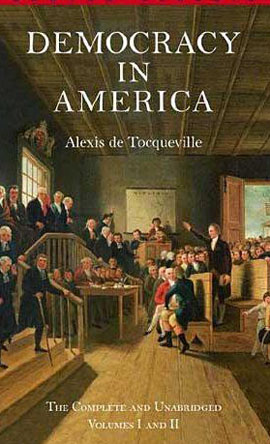 Meanwhile, back in the old royalist UK, commentators like Jeremy Warner would no doubt see de Tocqueville’s great two volumes of the 19th century on the crucial principles of American democracy (an essential legacy of the historic North American culture of the independent family farm) as some kind of “European sclerosis” – a case of massive Orwellian double-speak, at the very least. But the real dynamism that has made the story of economic development in the USA such a historic success has flowed from the recurrent real opportunity enjoyed by the mass producers and consumers set free by the westward march of the mass settlement frontier (and not by some over-wealthy and arrogantly manipulative elite of alleged “job creators”).
Meanwhile, back in the old royalist UK, commentators like Jeremy Warner would no doubt see de Tocqueville’s great two volumes of the 19th century on the crucial principles of American democracy (an essential legacy of the historic North American culture of the independent family farm) as some kind of “European sclerosis” – a case of massive Orwellian double-speak, at the very least. But the real dynamism that has made the story of economic development in the USA such a historic success has flowed from the recurrent real opportunity enjoyed by the mass producers and consumers set free by the westward march of the mass settlement frontier (and not by some over-wealthy and arrogantly manipulative elite of alleged “job creators”).
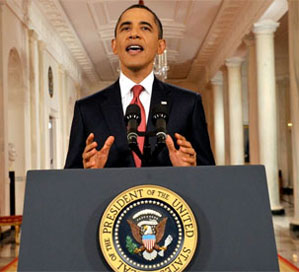
President Barack Obama appeals for compromise during his televised address to the nation on 25 July 2011, regarding the debt ceiling negotiations. AP Photo/Jim Watson.
By a lucky stroke of the kind of brilliance that actually has recurrently re-energized and renovated the American economy, and the broad mass culture of the USA at large, the first African American president, Barack Obama, is at least trying to speak for this legacy of mass-based economic prosperity today – in the same tradition of the Franklin Delano Roosevelt who called the economic royalists of the 1930s what they really were. Anyone who authentically cares for the future of “American world leadership” – at home and abroad – can only hope and pray that President Obama somehow manages to win the crazy political game afoot in Washington right now, in the very end. (Following what may be the deepest principle of democracy in America: you can fool some of the people all of the time, and all of the people some of the time. But you can’t fool all of the people all of the time – in 2011, 2012, or any other time!)
